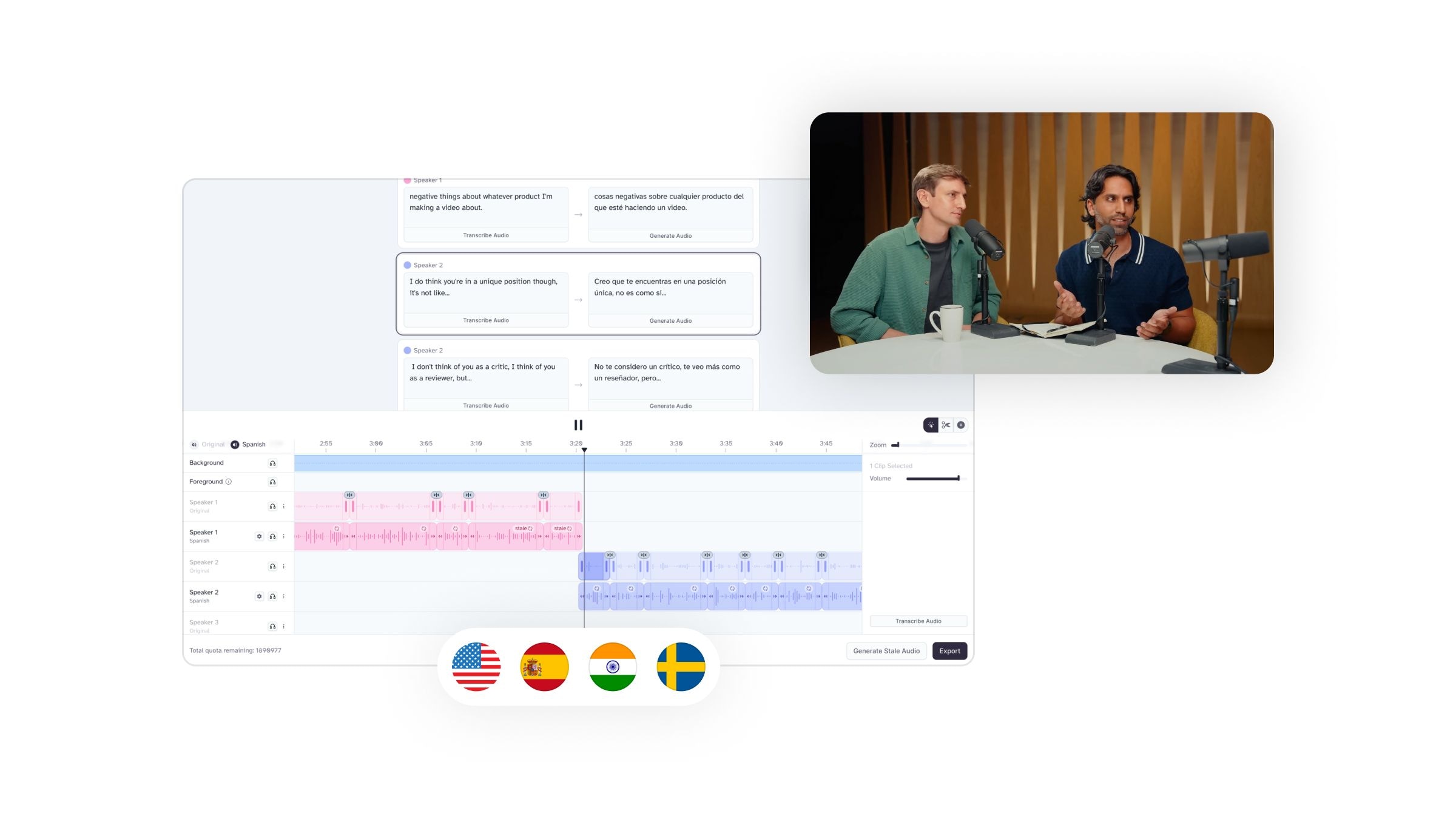
Traduza áudio e vídeo preservando a emoção, o timing, o tom e as características únicas de cada interlocutor
Desenvolvedores de videogames estão recorrendo cada vez mais à tecnologia de voz IA — mas isso significa que a IA substituirá completamente os dubladores humanos?

Nos últimos anos, a indústria de videogames testemunhou uma revolução tecnológica sem precedentes, liderada pela integração da Inteligência Artificial (IA). Desde criar experiências mais envolventes para os jogadores até automatizar tarefas complexas, o impacto da IA é profundo e abrangente.
Entre suas várias aplicações, uma área que gerou considerável debate é o uso da IA na geração de dublagem para videogames. Essa abordagem inovadora promete agilizar a criação de conteúdo e oferecer novas capacidades, mas também levanta questões sobre o futuro dos papéis tradicionais de dublagem.
À medida que a IA continua a evoluir, torna-se crucial explorar como essa tecnologia pode remodelar o cenário da dublagem em videogames, pesando seus benefícios contra os possíveis desafios e considerações éticas.
A integração de IA na dublagem para videogames gerou um debate sobre as capacidades e limitações das vozes artificiais em comparação com suas contrapartes humanas. Esta seção explora as forças e desafios do uso de locuções IA, juntamente com os benefícios e desvantagens de depender de dubladores humanos, para fornecer uma perspectiva abrangente sobre esse cenário em evolução.

As locuções IA oferecem uma série de vantagens, ajudando os desenvolvedores de videogames a criar jogos mais rapidamente, de forma mais fácil e econômica do que antes:
Apesar dos benefícios, as locuções IA também apresentam vários desafios:

No entanto, há uma série de razões pelas quais você pode querer considerar o uso de dubladores humanos. Estas incluem:
Dito isso, também existem desvantagens significativas em usar dubladores humanos:
Esta exploração revela que tanto as locuções IA quanto as humanas têm suas forças e fraquezas únicas. A escolha entre elas depende das necessidades e objetivos específicos do projeto de videogame, bem como do impacto desejado no público.
Embora os dubladores IA e humanos tenham suas próprias forças e fraquezas, o futuro da dublagem em videogames pode estar na sinergia de ambos. Ao combinar a profundidade emocional e a criatividade dos atores humanos com a eficiência e as capacidades de localização das ferramentas de dublagem IA, os desenvolvedores de jogos podem criar experiências mais ricas e imersivas para jogadores em todo o mundo.
A abordagem ideal é ter dubladores humanos fornecendo as performances iniciais de locução, capturando toda a nuance, emoção e personalidade que eles trazem. Essas performances podem então ser alimentadas em uma ferramenta de dublagem IA como a ElevenLabs para gerar versões localizadas em outros idiomas.

Traduza áudio e vídeo preservando a emoção, o timing, o tom e as características únicas de cada interlocutor
Isso permite que os desenvolvedores se beneficiem das habilidades de atuação que o talento vocal humano oferece, enquanto aproveitam a IA para expandir seu alcance global de forma econômica. O melhor de tudo é que a IA aprende com a performance humana para manter a ressonância emocional e a qualidade da atuação em todas as versões de idioma.
À medida que a indústria de jogos se torna cada vez mais global, a capacidade de oferecer experiências emocionais e localizadas é mais crucial do que nunca. A combinação harmoniosa de dublagem humana e ferramentas de dublagem IA como a ElevenLabs representa um caminho empolgante para o futuro.
Ao combinar a arte dos atores humanos com as capacidades técnicas da IA, os desenvolvedores podem criar experiências narrativas que transcendem barreiras linguísticas e ressoam com os jogadores em um nível profundo em todo o mundo. É uma situação em que todos ganham.

A integração da Inteligência Artificial (IA) na dublagem para videogames não é apenas um salto tecnológico, mas também abre uma caixa de Pandora de considerações éticas.
Como desenvolvedores, abraçar ferramentas de IA como a ElevenLabs oferece eficiências e capacidades incomparáveis, mas é essencial navegar pelo cenário moral de forma ponderada.
Esta seção explora as implicações éticas que surgem com o uso de IA na dublagem, visando fomentar uma abordagem responsável para o uso dessas tecnologias.
A dublagem é uma forma de arte que envolve emoção, criatividade e experiência humana. Substituir ou complementar atores humanos com IA levanta questões sobre a desvalorização da integridade artística e o potencial de deslocamento de empregos.
O surgimento de tecnologias IA pode potencialmente reduzir a demanda por dubladores humanos, levando a preocupações éticas sobre compensação justa e reconhecimento das performances originais usadas para treinar modelos de IA. Portanto, é crucial garantir que os atores sejam compensados por suas contribuições ao processo de aprendizado da IA.
As vozes geradas por IA podem carecer da compreensão sutil dos contextos culturais e das sutilezas emocionais que os atores humanos naturalmente trazem para suas performances. Eticamente, é importante considerar como isso pode afetar a autenticidade dos personagens e a representação de culturas e emoções diversas nos jogos.
Além disso, utilizar IA na dublagem não deve ignorar oportunidades para um elenco diversificado e inclusivo. O uso ético da IA deve complementar os esforços para representar uma ampla gama de vozes e experiências de forma autêntica, em vez de homogeneizar as narrativas dos jogos.
Os desenvolvedores devem ser transparentes com o público sobre o uso de vozes geradas por IA nos jogos. Os jogadores merecem saber quando os personagens com os quais se conectam são dublados por humanos ou IA, pois essa transparência respeita o direito do público de ser informado.
Ao usar performances humanas para treinar modelos de IA, você deve obter consentimento explícito dos dubladores. Os atores devem estar plenamente cientes de como suas vozes e performances serão usadas e em que medida.
As gravações de voz usadas para treinar modelos de IA contêm dados pessoais. Garantir a segurança e a privacidade desses dados é fundamental para proteger os indivíduos de possíveis usos indevidos ou exploração de suas informações biométricas.
À medida que avançamos com a IA no desenvolvimento de jogos, é vital priorizar o desenvolvimento ético da IA que considere o impacto sobre indivíduos, comunidades e a indústria como um todo. Isso inclui diálogos contínuos com todas as partes interessadas envolvidas — desenvolvedores, dubladores e jogadores — para moldar um futuro onde a IA enriqueça a experiência de jogo sem comprometer os padrões éticos.
A jornada da dublagem em videogames evoluiu de performances puramente humanas para a introdução de vozes geradas por IA. À medida que a indústria de jogos continua a crescer e amadurecer, a escolha entre IA e dubladores humanos dependerá das necessidades específicas de cada projeto, orçamento e visão criativa.
Tanto a IA quanto os dubladores humanos têm papéis cruciais a desempenhar no futuro da narrativa digital. Enquanto a IA oferece eficiência, custo-benefício e capacidades multilíngues, os atores humanos trazem profundidade emocional, versatilidade e criatividade para suas performances. Ao aproveitar as forças de ambos, os desenvolvedores podem criar narrativas imersivas e emocionalmente envolventes que ressoam com os jogadores em um nível profundo.
À medida que a tecnologia avança e a sinergia entre a IA e o talento humano se fortalece, a voz do amanhã nos videogames será uma combinação harmoniosa do digital e do humano, cada um complementando o outro para oferecer experiências auditivas inesquecíveis que transportam os jogadores para novos mundos e os conectam com personagens cativantes.
Pronto para começar a usar locuções IA no seu videogame? Confira os recursos de text-to-speech e dublagem da ElevenLabs, ou explore nossa extensa biblioteca de vozes IA.

Crie vozes naturais com nosso sistema de Text to Speech (TTS), desenvolvido para narração de alta qualidade, jogos, vídeos e acessibilidade. Vozes expressivas, suporte multilíngue e integração com API facilitam a expansão de projetos pessoais para fluxos de trabalho empresariais.
.webp&w=3840&q=95)
Available 24/7 in 30+ languages, the agent can respond and book meetings instantly

How do we show that cloning a voice in 12 Indian languages with ElevenLabs is authentic, easy, and quick? We do it live.
Desenvolvido por ElevenLabs Agentes